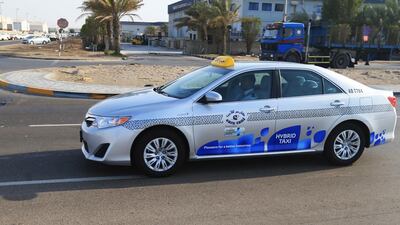DUBAI // When bosses at Cars Taxi first saw fuel-efficient hybrid cars in Europe and the United States they wondered whether the concept would work in the UAE, where petrol prices are significantly lower.
But after a year of operating more than 20 Toyota Camry hybrid vehicles in Dubai, the outcome has been resoundingly positive, said Abdul Razak, general manager for fleet maintenance at the company.
“The vehicle price is higher,” said Mr Razak, explaining that while a regular Camry would cost the company Dh80,000, a hybrid was Dh110,000. “But on the other hand, we are saving on fuel costs. We have saved 40 per cent on our fuel bills,” he said.
After the roll-out in Dubai, the company added more Camry hybrids to its Abu Dhabi fleet and now has about 50 in the two emirates. There are plans for more in the coming year.
The cars have a regular petrol engine as well as an electric motor and battery that is charged by harvesting energy that is otherwise wasted, for example from the vehicle’s momentum when slowing down or coasting. At speeds below 20kph, the cars switch to battery mode, perfect for driving on congested roads.
“During heavy traffic you can’t cruise, you have to move slow. These vehicles are good at that,” Mr Razak said.
A leader in hybrid technology, Toyota has sold more than six million such cars worldwide and currently offers 23 models. Al-Futtaim Motors, Toyota’s local distributor, believes the UAE is ready for the technology.
The company has “great plans for greener vehicles on the road” for the coming year, said Alan Carpenter, general manager for sales and marketing.
“Our recent involvement with Dubai Taxi Corporation, our first hybrid customers, and Cars Taxi proves just how much this technology is relevant to businesses in the UAE, even with the low fuel prices,” said Mr Carpenter.
“The [gas] emissions and cost savings compared to conventionally powered vehicles are immense, especially as performance and driving pleasures are not compromised. We feel the UAE market is ready for hybrid technology,” Mr Carpenter said.
Earlier this month, Toyota began selling its first commercial zero-emission hydrogen fuel-cell vehicle, the Mirai, in Japan.
While it could be a while before fuel-cell vehicles are produced in substantial numbers, electric cars are on their way to becoming mainstream, said Crijn Bouman, from the Swiss engineering and technology company, ABB.
Thanks to government support and incentives, there was growing demand for electric cars while improvements in technology are making them more competitive, he said.
In December, ABB announced it was leading a consortium to create a corridor of fast-charging electric car stations connecting Sweden, Denmark, Germany and the Netherlands. In China, the company’s fast-charging units are sold along with the Denza electric car, produced by German car maker Daimler and BYD, one of China’s fastest growing automotive and renewable energy companies.
For European countries and Japan, electric vehicles are a way to reduce dependence on oil imports. Various energy sources can be used to produce the electricity that powers plug-in cars, including clean sources such as wind and solar.
In the UAE, the Dubai Electricity and Water Authority announced this year it was looking at providing charging stations for electric vehicles in the emirate although full details are yet to emerge.
Renault is offering locally its two-passenger, fully electric Twizy at a starting price of Dh77,900. The car takes about three and a half hours to charge using a domestic electricity supply. It can reach 80kph and cover 85 kilometres on a single charge.
Six months after the launch, the company has sold 40 units to private owners, government institutions and companies wanting to showcase their green credentials, said Hakim Boutehra, Middle East commercial director for Renault. Among the customers are a real estate company using the cars for client viewings and an Abu Dhabi restaurant, which uses it for deliveries.
The company is testing the local performance of its popular electric passenger model, the Renault Zoe, and if results are good, the car could soon be available in the UAE.
vtodorova@thenational.ae

